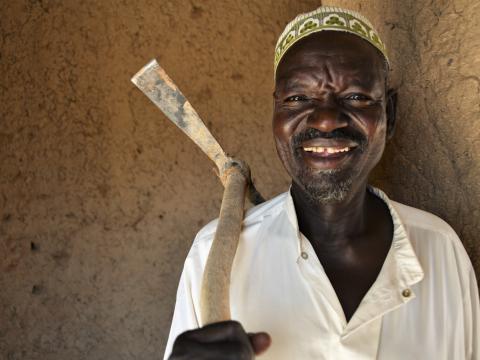World Vision and World Food Programme fight desertification in Niger

Desertification has besieged the village of Iskita for over 30 years. Their lands grew less fertile by the year and the yield of their planting seasons with it. The situation forced many into exodus to make ends meet. The heads of household resorted to manual jobs in Ivory Coast, Ghana and Nigeria to put food on their tables and send their children to school.

Yahaya, a 60-year-old man, laments those times. “When we harvested, we often ran out of food by the third or fourth month. Even the grain stocks were empty. I was forced to leave my family behind to do back-breaking work, but my children were my chief concern. It is what I had to do to make sure they survived.”
Yahaya has a large family with 15 children. “My husband was never available,” Haoua, his first wife lamented, “he was always away trying to make money.” Yahaya also remembers how dire the village’s situation was. “Everything we grew would wither. The livestock had nothing to graze on either.”
"All nine of my children of school-going age are now enrolled, and that makes me very happy, especially my four girls."
The World Food Programme (WFP) and World Vision in Niger partnered to provide a livelihood for 90 villages just like Iskita with a Cash-for-Work project. With research from the local authorities on the villages most vulnerable to increasing desertification, the partners worked with the communities to identify the most vulnerable households and provide them with work.
The project also worked to restore lands, with the selected household digging water retention ditches and planting wild grass. The project had an enormous impact on the villages and the lives of its participants. , Households, now making 32,500 FCFA (65 USD), are able to feed themselves and ensure their children are educated. Some have even been able to use the money for other ventures.

“We knew already knew World Vision. They already worked with us to ensure the health and education of our children so when they came with WFP we were ready to work with them,” Yahaya said. “Now, I have enough to take care of my family. I spend 20,000 FCFA on food, 7,000 FCFA on school contributions and save the rest. Over time, I have been able to build a flock of over ten sheep. All nine of my children of school-going age are now enrolled, and that makes me very happy, especially my four girls.”
The Cash-for-Work project has also restored 367 hectares of degraded land in Iskata alone and over 1,000 hectares across the 90 participating villages. The 15-month project ends in December 2019, but Yahaya is confident they will be able to sustain the gains made and restore their lands. “We will continue to restore our land and reap our bountiful harvests as we use to.”